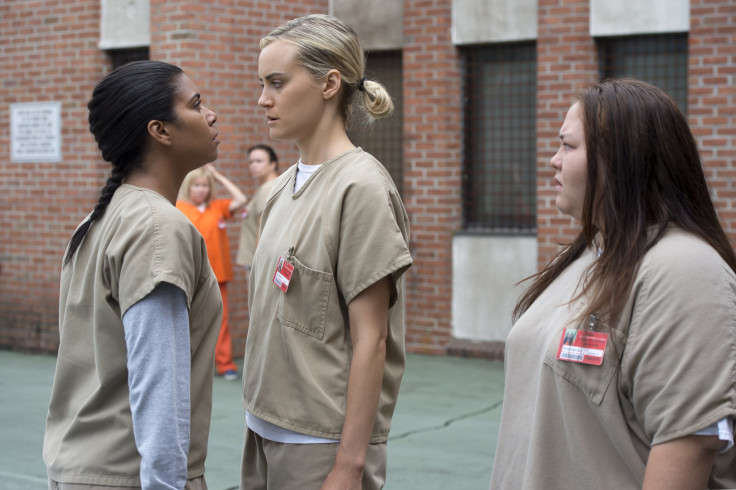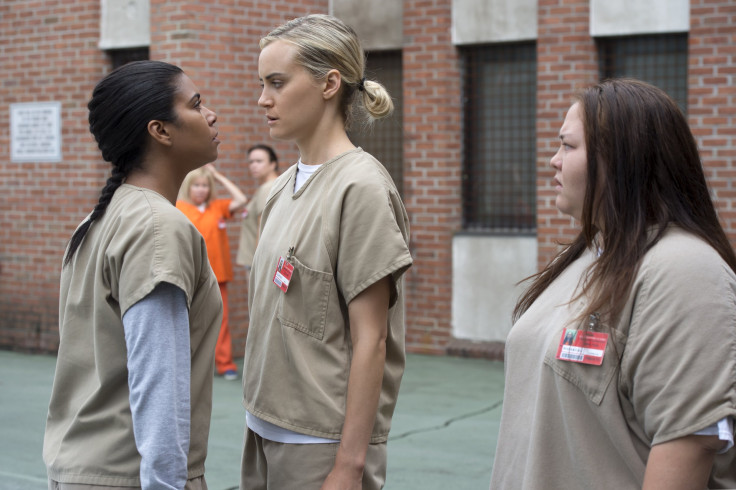'Orange Is The New Black' Season 4 Fact Check: 8 Ways Netflix Depicts Prison Life

"Orange is the New Black," is probably most Americans only peek into what life is like behind bars. The Netflix show offers a complicated look at a women's prison, showcasing how relationships develop between inmates, guards interact with prisoners and the often difficult living conditions behind bars. But is everything the action-packed show depicts accurate?
Here is a fact-check of eight of Season 4's biggest storylines:
1. Celebrities Receive Special Treatment
In "Orange is the New Black" Season 4, celeb-chef Judy King, played by Blair Brown, gets a private room when she shows up to Litchfield Penitentiary for tax evasion. However, Martha Stewart, the celebrity chef and television personality that inspired King, did not have it so easy. While serving five months for insider trading, Stewart mopped floors and cleaned toilets. Stewart was housed at a federal facility in Alderson, West Virginia, that some dubbed "Camp Cupcake" because of its relatively comfortable living conditions. But Stewart was still subject to strip searches and shared living quarters with other inmates.
Verdict: FALSE
2. Wardens Go Toy Shopping
Midway through Season 4, Litchfield's warden, Joe Caputo (Nick Sandow) travels to a prison industry convention. He browses new technology and attends panels full of excited wardens and private prison executives.
Those conventions do exist. The largest prison convention in the U.S. is held every year in New Orleans by the American Correctional Association. The closed-to-the-public convention offers workshops, panels and, of course, a trade show floor full of goodies from armored prison vans to anti-drone technology.
Verdict: TRUE
ACA Winterconference 2016 in New Orleans! Getting ready to rock da house! GO @Dedrone https://t.co/ObwjSCTAq3 pic.twitter.com/CgIrnRffzl
— Joerg Lamprecht (@JoergLamprecht) January 23, 2016
3. Prisons v. Drones
Speaking of drones, in "Orange is the New Black," tabloid photographers use drones to snap pictures of King in the prison yard. In reality, prisons do face a drone problem, but they are more often used to smuggle drugs and other contraband to prisoners in the prison yard. Inmates at one Ohio prison were able to receive 144.5 grams of tobacco, 65.4 grams of marijuana and 6.6 grams of heroin from a single drone drop.
Verdict: PARTLY TRUE
4. Piper's Panty Empire
Piper Chapman's (Taylor Schilling) Season 4 storyline concerns her rise to a power position in the prison as a result of her secret panty business — Chapman has other inmates wear lace underwear before smuggling it out of the prison to be sold online to fetishists. The writers did not completely make this scheme up. Sites selling worn panties, including those belonging to prison inmates, are popular among certain loyalists online.
Verdict: TRUE

5. Veterans as Prison Guards
After Season 3's guard strike, a new team of military veterans is brought into Litchfield in Season 4 to keep order. However, the former soldiers bring their wartime intensity to the prison and soon the ladies of Litchfield are facing some increasingly concerning instances of guard brutality. Prisons across the country are, in fact, recruiting veterans to fill out their guard rosters. While tying veteran status to overly aggressive guard behavior would be speculative, studies show that veterans do have a hard time readjusting to civilian life.
Verdict: TRUE
6. Trans Inmates Separated
A major plot line of Season 4 involves Sophia Burset (Laverne Cox), a trans inmate who begins the season in solitary confinement after a physical altercation with some transphobic prisoners. The prison claims Burset is being kept separate for her own protection, but some inmates, as well as her family on the outside, fight to see her released back into the general population. While that may not be an accepted practice on an individual basis, some prisons, including Riker's Island in New York, have opened special wings for trans inmates who have concerns for their safety.
Verdict: PARTLY TRUE
7. Wearing Hijabs In Prison
Alison Abdullah (Amanda Stephen), one of the new inmates in Litchfield, is a Muslim and observes her faith by wearing a traditional hijab around her head in the name of modesty. Abdullah also uses the garment to stash a secret cell phone she and some fellow inmates use to snap a picture of King.
Hijabs are not exactly part of the standard issue prison uniform, so viewers might be curious if they are actually allowed behind bars. Groups like the American Civil Liberties Union have fought to protect Muslim Americans' right to wear a hijab in any government-funded institution. The Religious Land Use and Institutionalized Persons Act (RLUIPA) prevents government officials from stopping a woman from wearing a hijab in any institution that receives federal funding, including state prisons, unless the government can show that its action was the "least restrictive means" for achieving a "compelling governmental interest." However, there have been instances of prisons seemingly ignoring that right without just cause.
Verdict: TRUE
8. Cell Phone Sweeps
After Abdullah uses her aforementioned cell phone to snap a picture of King, which she and a few other inmates later sell to a tabloid magazine, the guards sweep the prison for cell phones, collecting dozens of mobile devices hidden in nooks and crannies all over the prison.
Cell phones in prisons are actually a big problem and one the prison system has been dealing with for years. Earlier this year, a North Carolina gang leader orchestrated an abduction from behind bars and experts say that the presence of cell phones can contribute to the flow of contraband into the prison and can keep inmates connected to their criminal backgrounds on the outside. Prisons are continually developing technology to identify cell phones in their facilities and addressing the problem in other ways, such as raising guards' salaries to deincentivize smuggling in phones to inmates for cash.
Verdict: TRUE
© Copyright IBTimes 2024. All rights reserved.






















